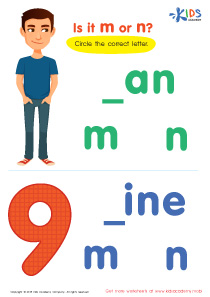Composing Numbers Quizzes for 5-Year-Olds
3 results
3 filtered results
Clear all filters3 filtered results
-
From - To
Unlock the world of numbers for your little learner with our interactive assessment quizzes tailored specifically for 5-year-olds! Our "Composing Numbers for 5-Year-Olds" series is designed to ignite curiosity and enhance understanding of basic numeracy skills in a fun, engaging way. Each quiz is crafted to evaluate and reinforce your child's knowledge of composing numbers, providing immediate feedback to encourage progress. Watch as your child delights in the challenge of mastering new concepts, gaining confidence with each correct answer. Dive into our interactive quizzes today and lay the foundation for a lifetime love of learning!
In the fascinating world of early childhood education, developing a strong foundation in mathematics is pivotal for young learners. Among the essential concepts that children begin to explore at this stage is the notion of composing numbers. This foundational skill is not just about learning to count but about understanding how numbers are formed and relate to each other. For 5-year-olds, who are at a crucial stage of cognitive development, interactive quizzes designed specifically on Composing Numbers offer an engaging and effective pathway to grasp these concepts.
Composing Numbers for 5-Year-Olds through interactive quizzes transforms what could be a daunting task into an exciting adventure. These quizzes are not just educational tools; they are gateways to curiosity, designed to stimulate the young mind and encourage a love for learning, especially in mathematics. Such interactive assessments serve multiple roles in a child's learning journey, from reinforcing newly learned concepts to identifying areas that require more focus.
Why are Interactive Quizzes on Composing Numbers Beneficial for 5-Year-Olds?
-
Engagement through Interaction: At the age of 5, children are naturally curious and eager to explore the world around them. Interactive quizzes utilize this innate curiosity by presenting learning as a form of play. This play-based learning approach is especially effective in keeping children engaged and motivated.
-
Building Confidence: Mastery of composing numbers can significantly boost a child’s confidence in their mathematical abilities. Through instant feedback provided in these quizzes, children can see their progress in real-time, which encourages a positive attitude towards learning and a willingness to take on new challenges.
-
Customized Learning Experience: Each child is unique, with their own pace and style of learning. Interactive quizzes on Composing Numbers for 5-Year-Olds are designed to adapt to the individual needs of each learner. This personalized approach ensures that every child finds the right level of challenge, making learning both effective and enjoyable.
-
Foundational Skill Development: Understanding the composition of numbers is a fundamental skill that forms the basis for more advanced mathematical concepts. Through these quizzes, children not only learn to compose numbers but also develop critical thinking, problem-solving skills, and numerical fluency, which are essential for their future academic journey.
-
Parent and Teacher Insight: Interactive quizzes provide valuable insights for parents and teachers into a child’s understanding of number composition. This information is crucial for identifying strengths, as well as areas that may need additional support, thereby enabling targeted teaching strategies.
In conclusion, interactive quizzes on Composing Numbers for 5-Year-Olds represent a blend of education and entertainment that is perfectly suited to the learning style of young children. By turning abstract mathematical concepts into engaging and interactive challenges, these quizzes lay a solid foundation for lifelong learning and appreciation for mathematics. As children navigate through these quizzes, they not only learn about numbers but also about persistence, problem-solving, and the joy of discovery. In essence, these interactive quizzes are more than just educational tools; they are stepping stones toward building confident, curious, and mathematically proficient learners.











